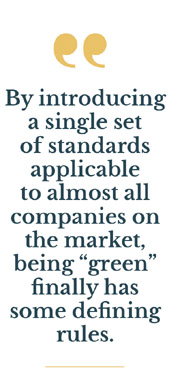Corporate Sustainability Reporting Directive is one of the newest large-scale European Union’s regulations that has widespread implications for the way business is to be conducted in the EU. Together with Taxonomy it should provide definitions, methods and metrics to define what constitutes “green” business. In practice, all companies included in the current NFRD regulation are set to start reporting on their sustainability performance and impacts next year according to the new European Sustainability Reporting Standards, with large companies and SMEs to follow in the years after.
Cutting through the Noise
Overall, the new CSRD rules are set to affect around 50 000 companies and eventually become a rule not just for EU-based enterprises, but also multinational companies looking to conduct business in the EU. Even those not directly included in the scope of CSRD will be affected indirectly. This is because many smaller companies serve as service providers, suppliers or partners for larger companies, which will demand proof of compliance in the form of sustainability reports. While larger listed corporations already reporting under NFRD or the voluntary GRI frameworks may be familiar with the system, the new reporting rules may prove challenging to all the reporting “freshmen”. Should they fail to comply with the new rules, they can face fines up to 10 million euros or 5% of their annual revenue and soon find themselves on the back foot among their competitors. However, there are also some significant benefits for those that get it right.
 Until recently, the term ESG has come under significant scrutiny. In short, being sustainable was seen by many as a marketing tool to make one more appealing to millennials more than anything. Many companies didn’t hesitate to trot out ambitious claims about sustainability without ever actually following up on them. However, by introducing a single set of standards applicable to almost all companies on the market, being “green” finally has some defining rules. For consumers, this means that they might finally get some clarity in how to “vote with their cash”. For companies, it means stepping up to their commitments.
Until recently, the term ESG has come under significant scrutiny. In short, being sustainable was seen by many as a marketing tool to make one more appealing to millennials more than anything. Many companies didn’t hesitate to trot out ambitious claims about sustainability without ever actually following up on them. However, by introducing a single set of standards applicable to almost all companies on the market, being “green” finally has some defining rules. For consumers, this means that they might finally get some clarity in how to “vote with their cash”. For companies, it means stepping up to their commitments.
A Value That Lasts
While ESG might be seen by many companies as an additional cost line, an increasing number of enterprises recognize that it can be treated as an investment. In the field of real estate development, we have long focused on sustainability factors as being key to a better product because we understand that true sustainability is economic and social, as well as environmental. For a real world example, our LEED certified office buildings have better insulation, heat pumps, CO2 sensors and a whole array of other cutting-edge technologies. For nature, this means lower emissions, less water use and less waste. But of course, this does impact the companies within the building quite significantly as well.
All of the design features and technologies we implement are also aiming to positively impact the company bottom line. Better energy efficiency means lower running costs. Advanced air filtration, chilled beams and sensors naturally lower energy demands, but they also create an environment where people feel less exhausted, report lower sick days and see significant increase in productivity. Given that employees tend to be the most costly item in any given companies expenses, ESG compliant premises shouldn’t be just about sustainable goals but also a part of basic budgeting.
Furthermore, as the ESG agenda is growing in importance for a significant majority of employees, maintaining a strong stance on it can be a key factor in attracting new talent and maintaining the existing workforce motivated. Multiple surveys have shown that employees, most significantly younger generations, are actively seeking an employer who can boast positive impacts in environmental or social issues. For some, working in such a company would even be worth a pay cut. A well-developed ESG stance is therefore also a question of prestige and strong employer branding. Even those who do not see sustainability as a priority will consequently seek it simply because of the positive long-term impact on their wallet.
Robustness in Three Letters
When done right, ESG can thus be, in more than one way, a tool to improve efficiency and compensate for future risks. It is not just a question of compliance with the ever-growing set of bureaucratic rules - or at least it shouldn’t be seen that way. It is an opportunity to create a better product that has higher long term returns. It is no surprise that according to a PWC survey, 79% of investors say that the way a company manages ESG is an important factor in their decision making. To fully embrace ESG reporting means to demonstrate the capability to holistically approach future impact analysis, financial factors, employer branding and more. The way companies grapple with it in the next few years and whether they successfully integrate it into their corporate strategies might be more than just fear-driven rush to avoid non-compliance fines. It can become the most significant dividing line between market leaders and those who get left behind.
Igor Bubeník, Communications Manager & Head of ESG, CORWIN SK a.s.



Follow us